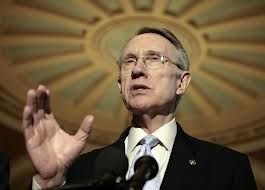Harry Reid Won’t Run for Re-Election to Senate in 2016
< < Go Back
Minority leader was first elected to Senate in 1986.
Senate Minority Leader Harry Reid (D., Nev.) won’t run for re-election in 2016, ending a storied career in the Senate after three decades and opening a competition to replace him as the chamber’s top Democrat.
Mr. Reid, 75 years old, said in a video message posted Friday on Twitter that he would retire at the end of 2016. The Senate’s majority leader from 2007 until January of this year, Mr. Reid said his decision came after he had time to think while recovering from an exercise accident over the holidays.
“We have to make sure that the Democrats take control of the Senate again,” Mr. Reid said. “And I feel it is inappropriate for me to soak up all those resources on me when I could be devoting those resources to the caucus, and that’s what I intend to do.”
President Barack Obama, calling into Nevada Public Radio during an interview it was conducting with Mr. Reid, praised the top Senate Democrat for doing “an unbelievable job on a whole bunch of really tough issues.”
Mr. Reid’s retirement immediately upends the battle for the Senate seat in Nevada.
“With the exception of Reid, every elected statewide official in Nevada is Republican, and this race is the top pickup opportunity for the GOP,” Ward Baker, executive director of Senate Republicans’ campaign arm, said in a statement Friday.
Democrats dismissed the idea that Republicans would be able to take over the seat held by Mr. Reid since his election in 1986.
Mr. Reid, who made much of his humble origins, was born in the tiny town of Searchlight, Nev. A boxer, he brought a pugilistic style to politics as he made his way up the Nevada power elite as a trial lawyer, head of the Nevada Gaming Commission, eventually elected to the House in 1982. He was elected to the Senate in 1986, a good year for Democrats that gave the party control of the Senate—which they held until 1995.
He was elected Senate Democratic leader in 2004 after the election defeat of Sen. Tom Daschle of South Dakota. He served as minority leader until his party won back the majority in 2006.
His years as leader have had a major impact on the institution, which has grown increasingly polarized over the last decade and lost its traditional character as the part of Congress more amenable to bipartisanship and compromise. As Republicans increasingly used delaying tactics to block executive branch and judicial nominations, Mr. Reid engineered a major change in the Senate’s filibuster rules to make it easier to bring such nominations to a vote.
Senate Majority Leader Mitch McConnell (R., Ky.), Mr. Reid’s sparring partner on the floor of the Senate over the last six years, praised his “distinctive grit and determined focus.”
During the 2014 election cycle, when many red-state Democrats were up for re-election, Mr. Reid ran the Senate in a way that limited their exposure to politically risky votes by curbing the number of amendments that came to a vote. Mr. Reid faced intense criticism from Republicans who decried his iron-fisted leadership as unfair to the minority party.
But he also angered some fellow Democrats. After the party lost control of the Senate, he won re-election as party leader—but lost the support of a handful of swing-state Democrats in the closed-door balloting.
More From The Wall Street Journal (subscription required):




